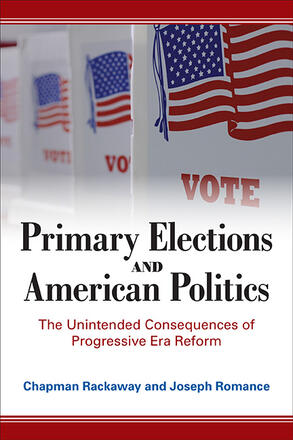
Primary Elections and American Politics
The Unintended Consequences of Progressive Era Reform
Alternative formats available from:
Argues that Progressive Era reforms had the counterintuitive effect of weakening political parties and their role in representative government.
Description
The last twenty years has seen a series of changes to American party politics: polarization, negative partisanship, decreasing voter turnout, and decreasing faith in elections and government. In Primary Elections and American Politics, Chapman Rackaway and Joseph Romance trace the origins of these and other problems to one of the most controversial reforms in American political history: the direct partisan primary election. With a comprehensive history of the primary election, the authors link the rise of primaries to the many political ills the nation faces today. They argue that the Progressives who created the primaries mistook direct democratic reforms, like the primary, for participatory democratic reforms like deliberative polling or participatory budgeting.
Chapman Rackaway is Professor and Chair of Political Science at Radford University. His many books include The Unorthodox Presidency of Donald J. Trump (coedited with Paul Rutledge) and American Political Parties Under Pressure: Strategic Adaptations for a Changing Electorate (coedited with Laurie L. Rice). Joseph Romance is Instructor of Political Science at Grand Canyon University. His many books include The Challenge of Politics: An Introduction to Political Science, Seventh Edition (coauthored with Douglas W. Simon) and Democracy and Excellence: Concord or Conflict? (coauthored with Neal Riemer).
Reviews
"As Rackaway and Romance outline, mistrust of parties runs throughout American political history. Yet, they advance provocative arguments that weakening parties might have weakened democracy and that democracy's problems are not always solved by more democracy. They argue that the Progressives' push for direct primaries was built around a faulty premise about citizen participation. Further, by focusing on the ills of parties, Progressives missed seeing their valuable role as linkage institutions that make it easier for citizens to participate." — Laurie L. Rice, coauthor of Web 2.0 and the Political Mobilization of College Students